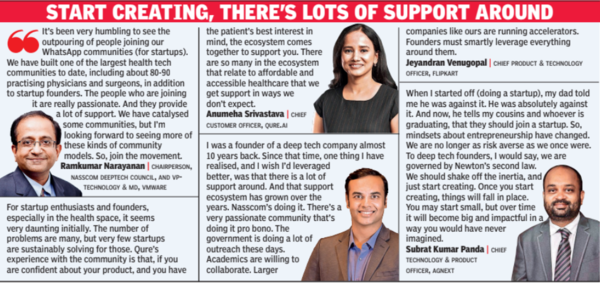[ad_1]
Anumeha Srivastava, chief customer officer at Qure.ai, said on our webinar last week that this technology built in India has been taken to 85 countries. The solutions have been the result of deep research work involving multiple disciplines. “One of our first papers was published in Lancet (the renowned peer reviewed general medical journal). Since then, we have published more than 50 peer reviewed papers,” she said.
India is starting to see really exciting deep tech ventures like Qure.AI, and that was the focus of our discussion on the webinar, which we held in association with Nasscom on the occasion of its Future Forge event (previously called Product Conclave). Deep tech ventures build researchdriven products that solve deep problems, they make fundamental breakthroughs in emerging technology areas. Such ventures are critical for India to emerge as a global innovation hub.

Agnext has built hardware and software, including sensors and AI, that can determine the quality of a food item at a fraction of the cost and time of traditional methods. Subrat Kumar Panda, chief technology & product officer at the Chandigarhbased company, said traditional processes involve specialised chemists and lab instruments to determine, for instance, the physical characteristics and the pungency of chilli in order to fix its price. “This test, traditionally, would take 24 hours, and cost over Rs 1,500. Our technology can test this out in two minutes, at a fraction of the cost,” he said. Agnext has begun to take the product to global markets, and is working on filing patents.
Till quite recently, ecommerce companies weren’t seen as deep tech ventures; they were just platforms enabling buyers and sellers to come together. Today, Flipkart has gone way beyond that. Jeyandran Venugopal, chief product & technology officer at the pioneering venture, said they have a data science team of several 100 people that regularly publishes research papers in top global journals. The company has built IPs (intellectual property) in a number of areas – algorithmic pricing, advertising technology, trust & safety in ecommerce – and which it has converted into SaaS products that are being sold to e retailers in South Africa, West Asia, and North and South America.
This business, Venugopal said, has been growing almost 100% yearonyear since incubation twothree years ago. Ramkumar Narayanan, chairperson of Nasscom DeepTech Council, and VP of Technology & MD at VMware, said India has about 3,400 deep tech startups. The next wave of companies that will get created, he said, will be around deep tech. “Our projection is that by 2030, there will be a 30x growth, with many Indian companies stepping into the global market,” he said.
Four challenges However, he noted that there are four big challenges that India must overcome. One is funding Institutional investors are not often ready to fund basic research.
The government needs to step in. Narayanan said the National Research Foundation established earlier this year, with a Rs 50,000 crore corpus, is a good beginning. The second challenge is talent. While India has a broad talent base, deep tech, Narayanan noted, involves an extra layer of complexity in the talent base required, one where “hardware, software, physics, chemistry, biology, all
come together.” Venugopal said that while the Flipkart brand attracts talent from the best universities in the world and the company has established R&D centres in Seattle and Israel, the talent pool available in emerging deep tech areas is very small, and the only way to build such talent is to upskill existing talent. Panda said it’s very important for the govern ment to find ways to create skilled talent in tier2 and 3 loca tions, talent that can be used to develop products at scale. Narayanan noted that educational in stitutions are starting to create crossdomain disciplines in their degree programmes.
The third challenge, Narayanan said, is market access. He said Nasscom is talking to regulators in different parts of the world to persuade them to accelerate regulatory recognition for Indian startups certified by Nasscom.
Anumeha said Qure.ai focused a lot on building a brilliant regulatory function. Today, most of its products are US FDA approved. The final challenge, Narayanan said, is around policy advocacy with the government. Here, he said, there’s been significant progress, with a deep tech policy in the works. The policy is expected to address all of the big issues deep tech ventures face.
[ad_2]
Source link










More Stories
India’S Growth Forecast: S&P ups India’s FY’24 growth forecast to 6.4% on robust domestic momentum
India to remain fastest-growing major economy, but demand uneven: Poll
Jack Ma: Jack Ma gets back into business with ‘Ma’s Kitchen Food’